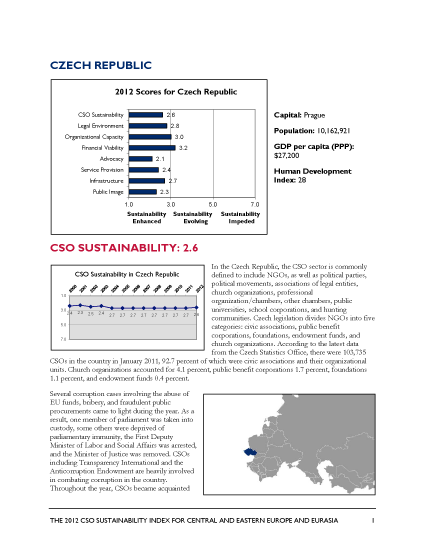CSO SUSTAINABILITY: 2.6
In the Czech Republic, the CSO sector is commonly defined to include NGOs, as well as political parties, political movements, associations of legal entities, church organizations, professional organization/chambers, other chambers, public universities, school corporations, and hunting communities. Czech legislation divides NGOs into five categories: civic associations, public benefit corporations, foundations, endowment funds, and church organizations. According to the latest data from the Czech Statistics Office, there were 103,735 CSOs in the country in January 2011, 92.7 percent of which were civic associations and their organizational units. Church organizations accounted for 4.1 percent, public benefit corporations 1.7 percent, foundations 1.1 percent, and endowment funds 0.4 percent.
Several corruption cases involving the abuse of EU funds, bribery, and fraudulent public procurements came to light during the year. As a result, one member of parliament was taken into custody, some others were deprived of parliamentary immunity, the First Deputy Minister of Labor and Social Affairs was arrested, and the Minister of Justice was removed. CSOs including Transparency International and the Anticorruption Endowment are heavily involved in combating corruption in the country. Throughout the year, CSOs became acquainted with the new classifications and legislation established by the Civil Code that will govern the sector when it comes into effect on January 1, 2014. Cooperation between key players in the CSO sector, who often have diametrically different views and who had not cooperated in the past, deepened during the year. The two groups worked together to create accompanying legislation to the new Civil Code, including the new Law on Public Benefit Status, the Law on Income Tax, and a bill that would allow a civic association to change its legal form to a public benefit corporation.








Comment
Make a general inquiry or suggest an improvement.